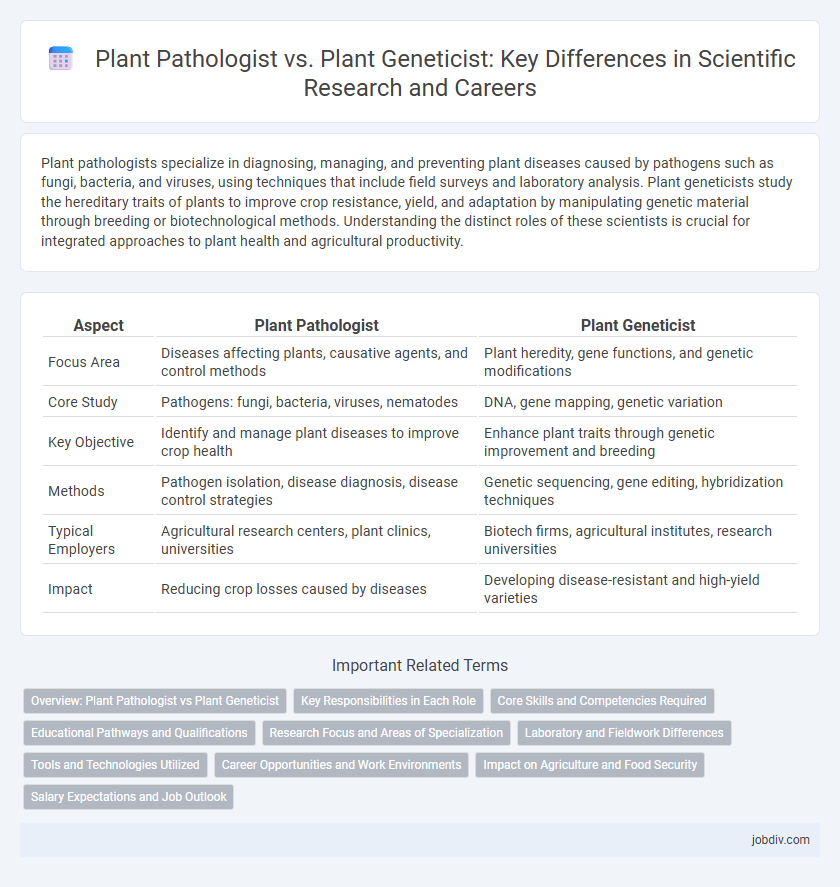Plant pathologists specialize in diagnosing, managing, and preventing plant diseases caused by pathogens such as fungi, bacteria, and viruses, using techniques that include field surveys and laboratory analysis. Plant geneticists study the hereditary traits of plants to improve crop resistance, yield, and adaptation by manipulating genetic material through breeding or biotechnological methods. Understanding the distinct roles of these scientists is crucial for integrated approaches to plant health and agricultural productivity.
Table of Comparison
| Aspect | Plant Pathologist | Plant Geneticist |
|---|---|---|
| Focus Area | Diseases affecting plants, causative agents, and control methods | Plant heredity, gene functions, and genetic modifications |
| Core Study | Pathogens: fungi, bacteria, viruses, nematodes | DNA, gene mapping, genetic variation |
| Key Objective | Identify and manage plant diseases to improve crop health | Enhance plant traits through genetic improvement and breeding |
| Methods | Pathogen isolation, disease diagnosis, disease control strategies | Genetic sequencing, gene editing, hybridization techniques |
| Typical Employers | Agricultural research centers, plant clinics, universities | Biotech firms, agricultural institutes, research universities |
| Impact | Reducing crop losses caused by diseases | Developing disease-resistant and high-yield varieties |
Overview: Plant Pathologist vs Plant Geneticist
Plant pathologists specialize in identifying, understanding, and managing diseases affecting plants caused by pathogens such as fungi, bacteria, viruses, and nematodes. Plant geneticists focus on the genetic makeup of plants, working to improve traits like yield, resistance, and stress tolerance through breeding and biotechnological methods. Both disciplines contribute to sustainable agriculture, with plant pathologists safeguarding plant health and plant geneticists enhancing crop performance at the molecular level.
Key Responsibilities in Each Role
Plant pathologists focus on diagnosing, managing, and preventing plant diseases by studying pathogens such as fungi, bacteria, viruses, and nematodes, aiming to protect crops and enhance agricultural productivity. Plant geneticists concentrate on analyzing plant DNA to identify genetic traits, developing improved crop varieties through breeding programs that enhance yield, resistance, and environmental adaptability. Both roles integrate fieldwork and laboratory research but differ primarily in their approach to addressing plant health and development challenges.
Core Skills and Competencies Required
Plant pathologists require expertise in diagnosing plant diseases, understanding pathogen biology, and implementing disease management strategies to protect crops effectively. Plant geneticists focus on genetic analysis, gene editing techniques, and breeding methodologies to develop plants with desirable traits such as disease resistance and improved yield. Both professions demand strong analytical skills, proficiency in laboratory techniques, and knowledge of plant biology, but their core competencies diverge with pathologists emphasizing pathogen interaction and geneticists specializing in heredity and molecular genetics.
Educational Pathways and Qualifications
Plant pathologists typically hold degrees in plant pathology, microbiology, or agricultural science, often requiring a bachelor's degree followed by a master's or PhD for advanced research roles. Plant geneticists pursue education in genetics, molecular biology, or biotechnology, with emphasis on undergraduate and graduate studies that focus on genetic modification and breeding techniques. Both fields value strong backgrounds in biology and laboratory skills, but plant geneticists prioritize courses in genomics and molecular genetics, whereas plant pathologists focus on pathology and disease management.
Research Focus and Areas of Specialization
Plant pathologists concentrate on diagnosing, studying, and managing plant diseases caused by pathogens such as fungi, bacteria, viruses, and nematodes to improve crop health and yield. Plant geneticists specialize in the study of plant genomes, gene expression, and genetic variation to develop improved plant varieties with traits like disease resistance, drought tolerance, and enhanced nutritional quality. Both fields employ molecular biology techniques but differ in their primary research objectives--disease prevention and management for plant pathologists versus genetic improvement and trait development for plant geneticists.
Laboratory and Fieldwork Differences
Plant pathologists primarily focus on diagnosing and managing plant diseases through laboratory analysis of pathogens and field observation of infection patterns. Plant geneticists conduct experiments both in laboratories using gene sequencing techniques and in field trials to assess the expression of genetic traits under varying environmental conditions. Laboratory work for pathologists involves culturing fungi and bacteria, while geneticists emphasize DNA extraction and gene editing, with both fields relying heavily on integrated field studies to validate their findings.
Tools and Technologies Utilized
Plant pathologists employ advanced diagnostic tools such as polymerase chain reaction (PCR), microscopy, and remote sensing to detect and manage plant diseases. Plant geneticists utilize genome sequencing, CRISPR-Cas9 gene editing, and bioinformatics software to analyze and manipulate plant DNA for trait improvement. Both disciplines integrate data from molecular markers and high-throughput phenotyping platforms to enhance crop resilience and productivity.
Career Opportunities and Work Environments
Plant pathologists primarily focus on diagnosing and managing diseases in crops, working in agricultural research institutions, government agencies, and extension services, which offer career opportunities in disease control and sustainable agriculture. Plant geneticists specialize in the genetic improvement of plants through biotechnology and breeding programs, often employed in genetic research labs, seed companies, and universities. Both careers involve laboratory and fieldwork but differ in focus, with plant pathologists concentrating on plant health and disease resistance, while plant geneticists prioritize genetic variation and trait development for crop enhancement.
Impact on Agriculture and Food Security
Plant pathologists play a critical role in diagnosing and managing plant diseases, thereby reducing crop losses and enhancing sustainable agricultural practices to secure global food supplies. Plant geneticists contribute by developing genetically improved crops with increased resistance to pests, diseases, and environmental stresses, which boosts yield stability and nutrient quality. Together, their combined efforts mitigate threats to agriculture and strengthen food security through advanced scientific research and innovation.
Salary Expectations and Job Outlook
Plant pathologists typically earn between $50,000 and $90,000 annually, with job growth projected at 5% through 2030 due to increasing demand for disease-resistant crops. Plant geneticists command higher salaries, often ranging from $60,000 to $110,000, driven by advancements in biotechnology and genetic engineering. The job outlook for plant geneticists is robust, with expected growth rates around 7%, reflecting the critical role of genetic research in sustainable agriculture.
Plant Pathologist vs Plant Geneticist Infographic

 jobdiv.com
jobdiv.com